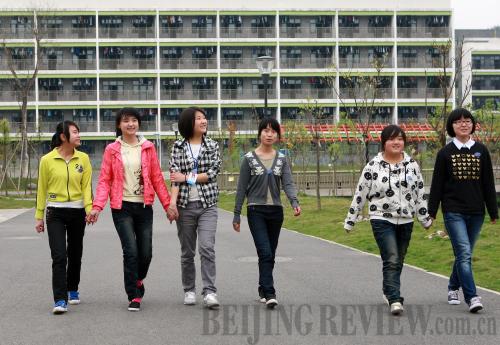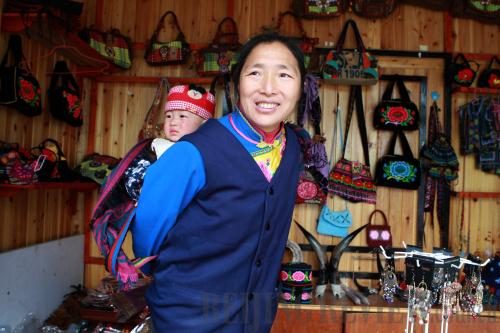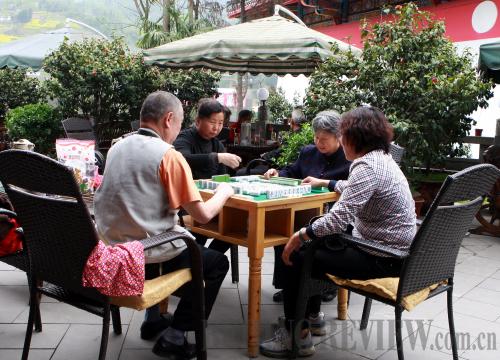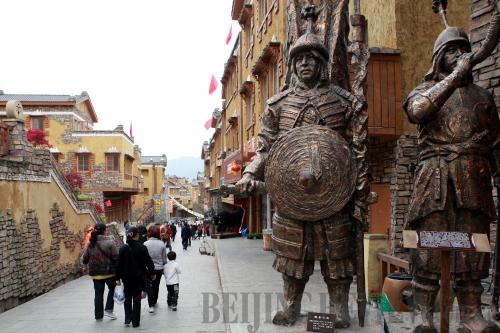|
 |
 |
|
SAFE SCHOOL: Students strolling about the campus of the new Beichuan Middle School, which is capable of resisting seismic disturbances of up to 8.0 magnitude (JIANG XIAOYING) |
HANDICRAFT BUSINESS: Li Jiarong runs a store selling souvenirs including handmade Qiang embroidery works in Beichuan County. Many earthquake-affected areas in Sichuan focus on tourism in their efforts to revitalize the local economy (JIANG XIAOYING) |
|

|

|
|
LEISURE TIME: Residents play mahjong at the reconstructed Chanshou Ancient Street in Shuimo Township of Wenchuan County on April 21 (JIANG XIAOYING) |
LOCAL FLAVOR: Wenchuan's Shuimo Township becomes a tourist attraction showcasing authentic Qiang ethnic culture (JIANG XIAOYING) |
To cope with post-quake psychological trauma, the primary and middle schools have offered programs to help the students get rid of the horrible memories. Three volunteer psychiatrists from Hong Kong are operating a workshop in the new Beichuan Middle School.
"Sometimes I will go to the workshop. The kindly volunteers there will help us by engaging us in all kinds of interesting and thought-provoking games," said Yang.
Though relocated to a new home, Yang didn't find any trouble getting used to the new environment. She is occasionally troubled by persistent thoughts of how her lost classmates might have enjoyed the new school.
Yang said she hopes to attend a university in Wuhan, Hubei Province. "I spent two months in a hospital in Wuhan to be treated for my waist wound after the quake. I like those people there, and now we still keep in touch," she said.
Business career
Yang Zhengfeng, 47, had a promising life ahead of her in Zhongtanbao Village in Yingxiu Township, Wenchuan County, the epicenter of the 2008 earthquake. She planned to build a new house and open a bed-and-breakfast. All of the construction materials were available and she prepared to begin construction on May 13, 2008, but one day before her big moment, calamity took everything away.
Fortunately, all her family members survived but they suffered a loss of 100,000 yuan ($15,390) and lost their farmland, an almost crippling blow to a family deriving much of its income from agriculture.
During the Spring Festival of 2011, Yang's family moved with 380 other relocated households into their new homes. They paid 50,000 yuan ($7,695) and received matching funds from the government and the Red Cross.
"Many of our villagers lost their farmland due to the earthquake, making unemployment an outstanding problem. We are trying to shift them from agriculture to service industries such as tourism, and growing ornamental flowers," said Zhang Tongrong, Mayor of Wenchuan. The local government in Wenchuan has also organized training courses in ethnic Qiang embroidery.
Yang spent 20,000 yuan ($3,078) to open an in-home restaurant serving Sichuan cuisine in January. Her son serves as chef and her daughter and daughter-in-law are the waitresses. The first floor of her home is the dining room. "Now all we have is the new three-story apartment and we have to make a living off of it," said Yang.
In the first two months after the restaurant opened for business, its monthly profits exceeded 5,000 yuan ($770). "The business is good so far, and our busiest time comes on the weekends when tourists flock in from Chengdu and nearby cities," Yang said. She said she hopes the government could make greater efforts to promote the village so as to attract more tourists.
But Yang still has something to worry about concerning the future of her restaurant. "Recently more and more restaurants have opened in our village, I can see the competition is getting tougher," Yang said.
County Mayor Zhang also acknowledges this looming problem. He said such homogeneous competition is seen among not only restaurants, but also teahouses, hotels and souvenir shops. "Our next step is to make a plan to effectively avoid such a situation, and we are considering designate different sections of the village for different services," said Zhang.
About 10 km away from Zhongtanbao, Shuimo Township's tourist economy is thriving. The 2008 earthquake killed 92 people and seriously damaged buildings and much of the public infrastructure in Shuimo.
With an investment of 130 million yuan ($20 million), it has been built into a tourism town that includes 170 residential buildings and accommodates over 300 households. Dozens of enterprises have been shut down in the town, which has become an environmentally friendly tourist attraction showcasing authentic Qiang ethnic culture. Shuimo's reconstruction plan received the Global Best Implementation of Post-Disaster Reconstruction Award at the Sixth Global Forum on Human Settlements held at the UN headquarters in New York in early April.
| 